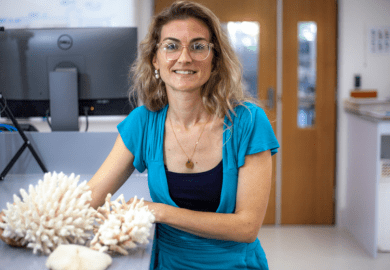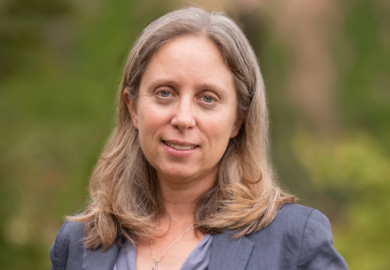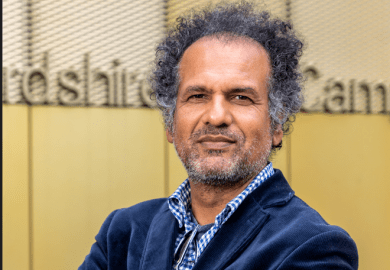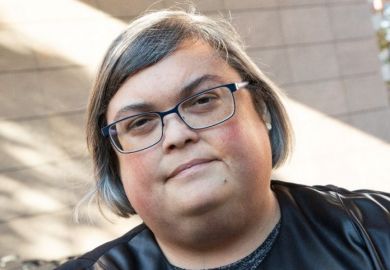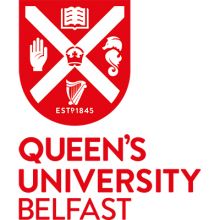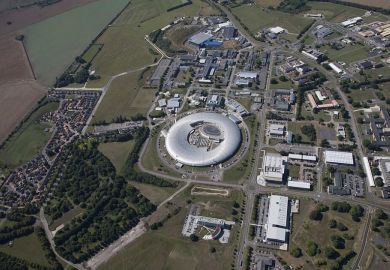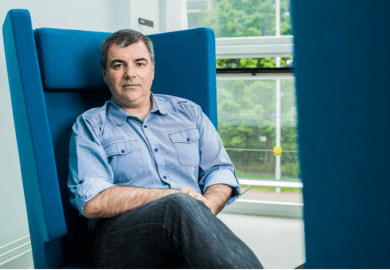Stephen Smartt is Philip Wetton professor of astrophysics at the University of Oxford and professor of astrophysics at Queen’s University Belfast. He discovered stars that explode as supernovae, measuring their mass, luminosity and the chemical elements synthesised. With children’s author Oliver Jeffers, he created Our Place in Space, a realisation of the solar system as a 10km sculpture trail. This has since been featured in a new Minecraft world and downloaded more than a million times.
Where and when were you born?
Belfast, 1968.
How has this shaped who you are?
Northern Ireland in the 1970s and 1980s was understandably quite a different place from the rest of the UK. At the time, I didn’t appreciate how deep the societal divisions ran and how profoundly that influenced and limited life choices. The divisions imprinted restrictions on future generations and it is still a very divided society for many. A sizeable fraction have moved on, but the socially and economically deprived areas have been left behind, with little sign of real change. Mentally, I think I’m quite resilient and I don’t stress. When facing difficult situations, I’ll be confident that I’m mentally stronger than most and I’ll see it through.
Have you had a ‘eureka’ moment?
When I arrived as a postdoc in Cambridge, I started a new project on finding the progenitor stars of supernovae in nearby galaxies. Working with different people there, I realised this was possible due to the large number of galaxies that had been observed by the Hubble Space Telescope and the increasing rate of supernova discoveries in those galaxies. I remember the first time we were successful in carefully aligning the images of a supernova and one that Hubble had taken a few years before explosion. Exactly at the position of the supernova was a faint red star – a red supergiant in the galaxy M74. It was a “that’s it!” moment, and it confirmed decades-old models of stellar evolution and supported the standard theory of supernova explosions.
What was your most exciting discovery?
I led one of the teams that discovered the first electromagnetic counterpart to a gravitational wave source. As we collected and analysed the data over a period of two months in 2017, the picture started to emerge of what stuff is ejected when two neutron stars merge. As the neutron stars merged, giving the gravitational wave signal, the associated explosion that we observed ejected about 4 per cent of the mass of the sun – the rest formed a black hole – moving at a fifth of the speed of light and made up of chemical elements heavier than iron. Working through the data analysis with a really talented team, writing the paper over a few weeks while training for the Dublin marathon, is a period I’ll never forget. Three hours and 11 minutes, if you’re asking!
How rewarding was it to be able to walk around in your own exhibit in Our Place in Space?
I was truly delighted when the trail, a scale model of the solar system, opened in Derry. The combination of the completion of the project, as we’d envisaged it, the buzz around the city and the early thoughts of people as it was unveiled was a remarkable experience. Oliver would generally be recognised but I could walk around anonymously listening in to people’s conversations and reactions. Comments such as “Is that really the size of the Earth? It’s that small?” were very gratifying. People felt and experienced the scale rather than trying to figure out what numbers mean.
How important is it to use new platforms, such as Minecraft, to reach younger learners?
I think I’ve learned that trying new ways to communicate ideas is rewarding, fun and probably essential. Children learn in different ways and inspiration can reach them through different platforms. That’s the goal, to spark an interest that changes the way they think.
How important is the public’s understanding and appreciation of your field to improving further study?
We are publicly funded. Recognition that the public are interested in the major questions of the origins of the universe, the chemical elements, the solar system, the Earth and, ultimately, life, is essential. Society has an appetite for these questions, and I find it quite motivating that we are funded to address them. From my time as a PhD student, I’ve thought it was our duty to help educate and promote the results of our research. Looking back, I was quite an uncomfortable and poor communicator then, but I thought it was important and I worked to improve. I did nothing special, just practice, putting myself in situations where I had to communicate. Science has to – and does – return great economic and health benefits to society. That’s necessary but not sufficient; we also need great science communication to enrich lives, much like art does.
What is the biggest misconception about your field of study?
People outside the field of astronomy don’t often appreciate the mathematics, physics and computer science that underpins the quantitative work. There’s some perception that it is not as rigorous as lab-based physics and we spend our time gazing through telescopes.
Tell us about someone you’ve always admired.
Richard Feynman, a truly remarkable physicist and communicator. He was one of the great scientists of all time due to his work in quantum physics. He had astounding technical insight, mathematical skills and intuitive understanding. What made him all the more remarkable was his ability as a teacher and communicator. His recorded interviews and classroom lectures sparkle even today.
What advice would you give to your younger self?
Grasp opportunities when they arise, recognise those opportunities early. Life-changing opportunities do not come round often.
patrick.jack@timeshighereducation.com
CV
1988-91 BSc, physics and applied mathematics, Queen’s University Belfast
1993-96 PhD, astrophysics, Queen’s
1996-99 Astronomer, Isaac Newton Group of Telescopes, Canary Islands, Spain
1999-2004 Postdoctoral fellow, Institute for Astronomy, University of Cambridge
2004-present Lecturer and, from 2006, professor, Queen’s
2011-2017 Director, Astrophysics Research Centre, School of Maths and Physics, Queen’s
2005 Philip Leverhulme Prize
2012 Elected to Royal Irish Academy
2018 Royal Irish Academy gold medal in physical and mathematical sciences
2020 Fellow of the Royal Society
2021 Herschel Medal, awarded by the Royal Astronomical Society
2022-present Philip Wetton professor of Astrophysics, University of Oxford
Appointments
Jenny Martinez has been named provost of Stanford University. Currently dean of Stanford Law School and Richard E. Lang professor of law, she will take up the post in October, succeeding Persis Drell. Professor Martinez has been on the Stanford faculty since 2003 and previously served as the law school’s associate dean for curriculum. Richard Saller, Stanford’s interim president, described Professor Martinez as “a champion of inclusion, and a clear and reasoned voice for academic freedom. Jenny and I look forward to promoting the fundamental mission of a great university – that is, excellence in research and education with integrity.”
Patrick Chinnery has been appointed executive chair of the UK’s Medical Research Council. He is currently director of clinical sciences at the funder and professor of neurology at the University of Cambridge, where he is head of the department of clinical neurosciences. Professor Chinnery will take on the role in October, succeeding interim MRC head John Iredale. Dame Ottoline Leyser, chief executive of UK Research and Innovation, said Professor Chinnery was an “exceptional leader” who “brings a great breadth of experience from across the medical sciences combined with a deep knowledge of the organisation”.
Jennifer Caputo has been promoted to deputy vice-president for alumni engagement at Princeton University. At present she is assistant vice-president for alumni engagement operations.
Olga Onuch has been appointed professor of comparative and Ukrainian politics at the University of Manchester. The author of The Zelensky Effect was previously an associate professor at the institution.
Bashir Makhoul will be the next vice-chancellor of University Canada West, a private institution in Vancouver focused on business programmes. He was previously vice-chancellor of the UK’s University for the Creative Arts.
David Parkes will be the next dean of Harvard University’s John A. Paulson School of Engineering and Applied Sciences. He is currently George F. Colony professor of computer science.
Register to continue
Why register?
- Registration is free and only takes a moment
- Once registered, you can read 3 articles a month
- Sign up for our newsletter
Subscribe
Or subscribe for unlimited access to:
- Unlimited access to news, views, insights & reviews
- Digital editions
- Digital access to THE’s university and college rankings analysis
Already registered or a current subscriber?

